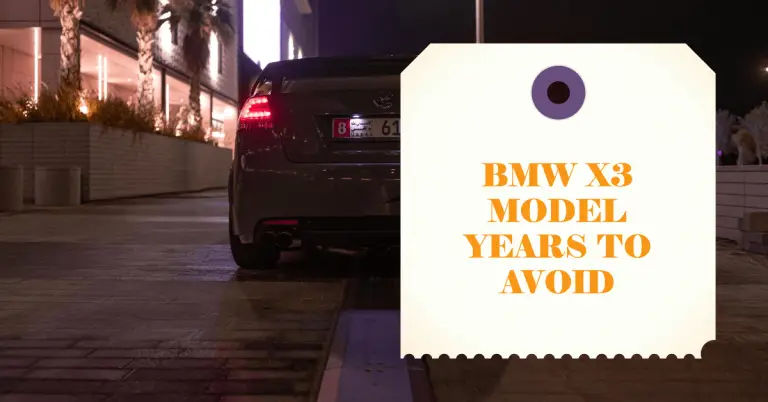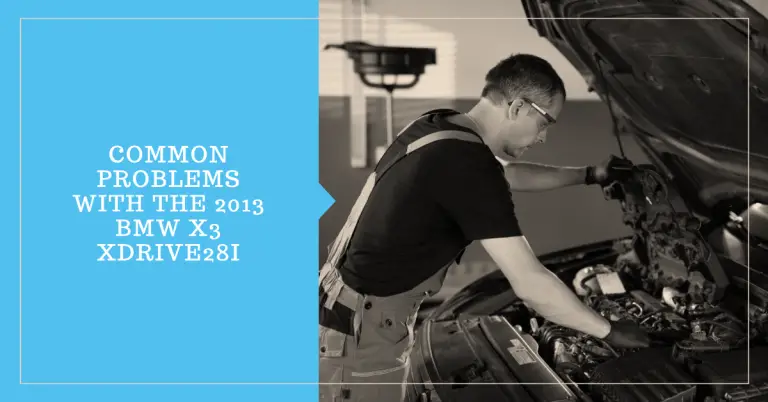Problems with BMW X3 – What Owners Need to Know
The BMW X3 is one of the most popular luxury compact SUVs on the market. Since its introduction in 2003, over 2 million X3s have been sold worldwide. With its responsive handling, refined interior, and potent engine options, it’s easy to see why the X3 is appealing.
But is the BMW X3 reliable, or does it have common problems that owners should look out for?
In short – yes, the X3 does have some problematic areas that can lead to expensive repairs if not addressed proactively. While no vehicle is perfect, being aware of the potential issues can help X3 owners make informed decisions to improve reliability.
In this detailed guide, we’ll cover the most common BMW X3 problems reported by owners across all model year ranges. We’ll look at issues with the engine, transmission, electrical systems, suspension, steering, and more. We’ll also discuss maintenance costs, which years tend to have more problems, whether an extended warranty is recommended, and tips to enhance reliability.
Common BMW X3 Engine Problems
One area that sees quite a few problems is the BMW X3’s engine. Here are some of the most reported engine issues:
- Oil Leaks – Models with inline-6 engines are prone to oil leaks from the valve cover gasket, oil filter housing gasket, and oil pan gasket. Oil leaks result in dirty engine parts and oil burning smells. The gaskets tend to fail around 60k-120k miles. Replacing all the gaskets can cost $800 or more in parts and labor.
- Excess Oil Consumption – Many X3 owners complain about low oil levels in between oil changes, indicating high oil consumption. The most likely causes are worn piston rings, valve guide seals, and timing chain guides. A complete engine overhaul may be needed in severe cases.
- Timing Chain Issues – The timing chain wears prematurely on some engines, causing a noisy rattle on startup and potentially complete timing chain failure. Replacing the timing chain and tensioners can exceed $2,000.
- Turbocharger Failures – Turbocharged engines found in the X3 xDrive35i are susceptible to turbo failures. Symptoms include loss of power, burning oil smell, and turbo rattle. Turbo replacements can be upwards of $2,500.
- Carbon Buildup – Carbon deposits accumulating on the intake valves is common, especially on direct injection engines. This can reduce performance and fuel economy. A walnut shell blasting service performed periodically can help remove the buildup.
Common Electrical System Issues
Electrical gremlins are another headache for X3 owners. Here are some of the most common electrical issues:
- Faulty Alternators – Alternator failure is very common on X3 models before 2015. Warning signs include dim lights, dead battery, and warning lights on the dash. Replacement costs around $500-$900 for parts and labor.
- Wiring Harness Problems – The wiring harnesses are prone to fraying and damage, leading to short circuits. This can cause all types of weird electrical faults. Repairing damaged wiring harnesses is time-consuming.
- Draining Batteries – Parasitic battery drain is a widespread complaint, often owing to faulty alternators or wiring issues. Some owners have had to replace multiple batteries. Use a multimeter to diagnose parasitic drain if your battery keeps dying.
- Sensor Failures – Various sensors including the crankshaft position sensor, mass airflow sensor, and oxygen sensors go bad prematurely, causing check engine lights and performance issues. Diagnosis and replacement costs add up quickly.
Transmission Problems
While not as pervasive as engine issues, the BMW X3’s transmissions do have some vulnerabilities:
- Rough Shifting – Jerky shifting, hesitation, and hard downshifts plagued some vehicles equipped with the GM-sourced 6-speed automatic transmission. Software updates from the dealer may provide a temporary fix. In worst cases, a transmission rebuild or replacement is required.
- Premature Failures – There are scattered reports of catastrophic transmission failure in vehicles with under 100k miles. This indicates weak internal hard parts. A complete transmission replacement can cost up to $5,000 or more.
- 4×4 System Malfunctions – Some owners encountered problems with the xDrive AWD system, including error messages, fluid leaks, and transfer case failures. Diagnosis and repairs for AWD issues are complex and expensive.
Additional Problem Areas
Beyond the major systems above, here are other common issues experienced by BMW X3 owners:
- Expensive Brake Repairs – Premature brake wear and warped rotors necessitate expensive brake service. Replacing pads and rotors can cost over $1,000.
- Suspension Noise/Wear – Abnormal noise from worn shocks, ball joints, and other suspension components is common. Replacing shocks and joints costs around $600-900 for parts and labor.
- Steering Rack Leaks – Power steering fluid leaks from a worn steering rack are widespread after 60k miles. Resealing or replacing the steering rack costs $900+.
- Faulty Fuel Pumps – Inconsistent fuel pressure and fuel pump failure is not uncommon after 80k miles. Fuel pump replacement runs around $800-$1,200.
- Water Pump/Thermostat Failures – Coolant leaks from a bad water pump or thermostat housing occur frequently. Repairs can run $600-$1,000.
- Blower Motor Breakdowns – Blower motors going bad is a frequent and annoying problem. Replacement costs around $500 for parts and labor.
What Model Years Have the Most Problems?
While X3s of all model years have the potential for issues, some model years have far more complaints reported than others:
- The 2007-2010 model years have the most widespread issues reported. Engine oil leaks, high oil consumption, faulty turbos, electrical faults, and transmission problems occurred frequently.
- The 2013 model year also had many reported engine and electrical issues. Oil leaks, turbo failures, alternator breakdowns, and wiring harness damage were most prevalent.
- On the other end, 2016 and newer X3 models have the fewest complaint trends and seem to be more reliable than earlier generations. However, it’s still smart to be aware of the potential problem areas.
Are BMW X3s Expensive to Maintain?
In one word – yes. The BMW X3 costs more to maintain than non-luxury compact SUVs. Some examples of elevated maintenance costs include:
- Oil changes can cost $150 or more at BMW dealerships, compared to around $70-80 at general repair shops for common vehicles. BMW recommends changing oil annually or every 10k-12k miles.
- Alternators often fail prematurely. Replacing an X3 alternator through a BMW shop typically costs $1000 or more in parts and labor. At an independent shop, expect to pay around $600.
- Many repairs require specialized tools and computer diagnostic equipment only BMW technicians have access to. This limits DIY repairs and competitive pricing at general repair shops.
Overall, maintaining a BMW X3 can easily cost 2-3x as much as a non-luxury vehicle. Budgeting $1,000 or more per year for maintenance is wise.
Should I Buy an Extended Warranty for the X3?
Due to the potential for expensive repairs down the road, most experts strongly recommend purchasing an extended warranty if you own an X3 past the factory coverage. Here’s a closer look at why an extended warranty makes sense:
- BMW’s factory bumper-to-bumper warranty is 4 years/50,000 miles. Major issues can develop after this coverage expires.
- An extended warranty offsets repair costs by paying for covered repairs after factory coverage runs out. This provides peace of mind and budget protection.
- Look for an extended warranty that provides comprehensive coverage of the engine, transmission, electronics, and AWD system up to at least 100k miles.
- Factory extended warranties from BMW are comprehensive but expensive. Third-party providers offer similar coverage for lower cost. Get quotes from multiple providers.
Tips to Make Your X3 More Reliable
While there’s no guarantee against issues, you can take these proactive measures to help enhance reliability:
- Stick diligently to scheduled maintenance outlined in your owner’s manual. Don’t delay oil changes, fluid flushes, etc.
- Use high-quality synthetic oil and OEM or Mann filters. Avoid cheap no-name oil and filters that provide inferior protection.
- Address small problems early before they cascade into major repairs. Pay attention to leaks, noise, and warning lights.
- Consider learning to perform basic maintenance yourself. DIY repairs like brakes, batteries, and filters can save a lot of money.
- Keep up with software updates and recalls. Your BMW dealer can check for and install any updates that fix bugs and problems.
Is the BMW X3 a Good Vehicle Choice Despite the Potential Issues?
Given the typical issues with X3s outlined in this article, is buying one still a wise choice? For most owners, the answer is a resounding yes. Here’s a summary of things to think about:
- The X3 continues to receive overwhelmingly positive reviews for its driving dynamics, luxury features, styling, and performance. Most owners love the actual driving experience.
- While problems do occur, addressing issues proactively and finding a trusted independent mechanic you can rely on goes a long way.
- Consider purchasing a newer model year with fewer widespread issues, and get an extended warranty to hedge against expensive repairs.
- Eyes open, the X3 can be reliable for years to come and provide the premium driving feel BMW is famous for. But be ready to spend more on maintenance than with a mainstream brand.
In closing, the BMW X3 remains one of the top choices in the luxury compact SUV segment. No vehicle is perfect, and being aware of the X3’s potential problem areas from the start allows owners to take steps to enhance reliability and longevity. With proper maintenance and care, an X3 can deliver many years and miles of driving enjoyment.







